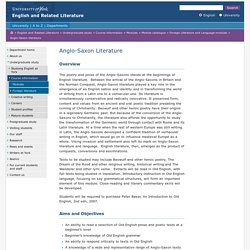

10 Notable Anglo-Saxon Works Besides Beowulf. Anglo-Saxon literature Facts, information, pictures. Discribe the features of Anglo-Saxon Poetry in detail. - Homework Help. The poetry of the Anglo-Saxons is defined by the following characteristics: 1.
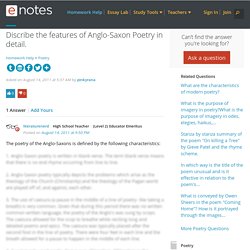
Anglo-Saxon poetry is written in blank verse. The term blank verse means that there is no end rhyme occurring from line to line. 2. The History of English - Old English (c. 500 - c.1100) About 400 Anglo-Saxon texts survive from this era, including many beautiful poems, telling tales of wild battles and heroic journeys.
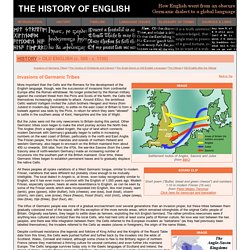
The oldest surviving text of Old English literature is “Cædmon's Hymn”, which was composed between 658 and 680, and the longest was the ongoing “Anglo-Saxon Chronicle”. But by far the best known is the long epic poem “Beowulf”. “Beowulf” may have been written any time between the 8th and the early 11th Century by an unknown author or authors, or, most likely, it was written in the 8th Century and then revised in the 10th or 11th Century. It was probably originally written in Northumbria, although the single manuscript that has come down to us (which dates from around 1000) contains a bewildering mix of Northumbrian, West Saxon and Anglian dialects.
The 3,182 lines of the work shows that Old English was already a fully developed poetic language by this time, with a particular emphasis on alliteration and percussive effects. The History of English - Old English (c. 500 - c.1100) Linguistics 201: History of the English Language. All languages change over time.
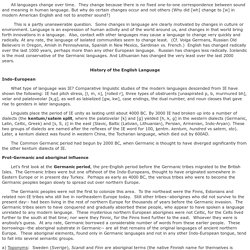
They change because there is no fixed one-to-one correspondence between sound and meaning in human language. But why do certain changes occur and not others (Why did [wh] change to [w] in modern American English and not to another sound?) This is a partly unanswerable question. Some changes in language are clearly motivated by changes in culture or environment. Language is an expression of human activity and of the world around us, and changes in that world bring forth innovations in a language. Narrative History of England - Part 4: The Anglo Saxon Period. Though much of Alfred's collection of laws came from earlier codes, there were some that were not derived from any known source and may thus be considered original.
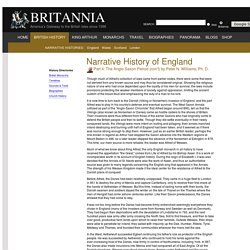
Showing the religious nature of one who had once depended upon the loyalty of his men for survival, the laws include provisions protecting the weaker members of society against oppression, limiting the ancient custom of the blood-feud and emphasizing the duty of a man to his lord. It is now time to turn back to the Danish (Viking or Norsemen) invasion of England, and the part Alfred was to play in his country's defense and eventual survival. The West Saxon Annals (utilized as part of the "Anglo-Saxon Chronicle" that Alfred began around 890), tell us that the Vikings (also known as Norsemen or Danes) came as hostile raiders to the shores of Britain. Their invasions were thus different from those of the earlier Saxons who had originally come to defend the British people and then to settle.
Alfred was born in 849. . Your guide to King Alfred The Great. The findings, announced on Friday, are the subject of a BBC Two documentary, due to be broadcast tonight.

Here, Barbara Yorke, professor emerita of early medieval history at the University of Winchester, tells you everything you need to know about King Alfred, the only English monarch known as 'the Great'. Q: Who was King Alfred? The Anglo-Saxon Influence on Romano-Britain: Research past and present. Anglo-Saxon. Anglo-Saxon England. Anglo-Saxon England England before the Germanic migration Back to the Syllabus Before the Germanic invasions Celts - Prior to the Germanic invasions Britain was inhabited by various Celtic tribes who were united by common speech, customs, and religion.
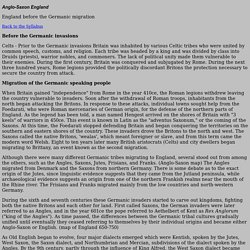
Each tribe was headed by a king and was divided by class into Druids (priests), warrior nobles, and commoners. Migration of the Germanic speaking people When Britain gained "independence" from Rome in the year 410ce, the Roman legions withdrew leaving the country vulnerable to invaders. Although there were many different Germanic tribes migrating to England, several stood out from among the others, such as the Angles, Saxons, Jutes, Frisians, and Franks. During the sixth and seventh centuries these Germanic invaders started to carve out kingdoms, fighting both the native Britons and each other for land.
Soon after the Germanic invasions, the inhabitants gave their settlements new names. History - Ancient History in depth: The Anglo-Saxons. Anglo-Saxon literature - English and Related Literature, The University of York. Overview.
